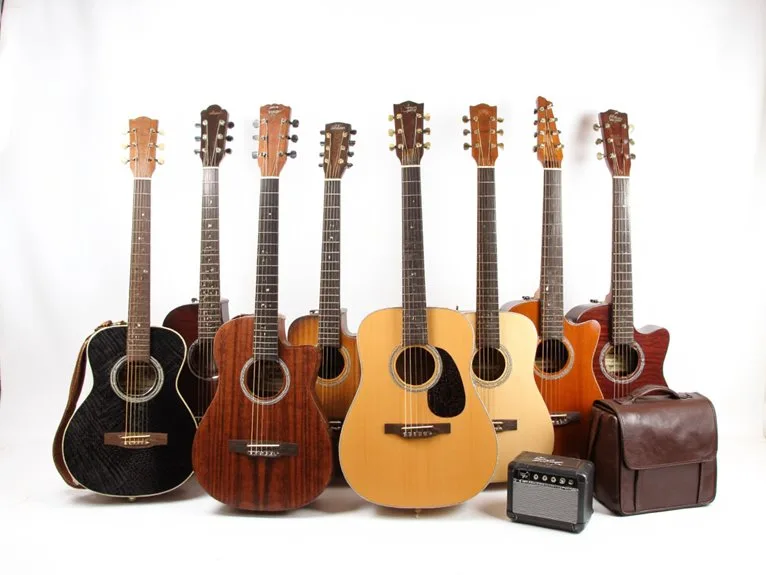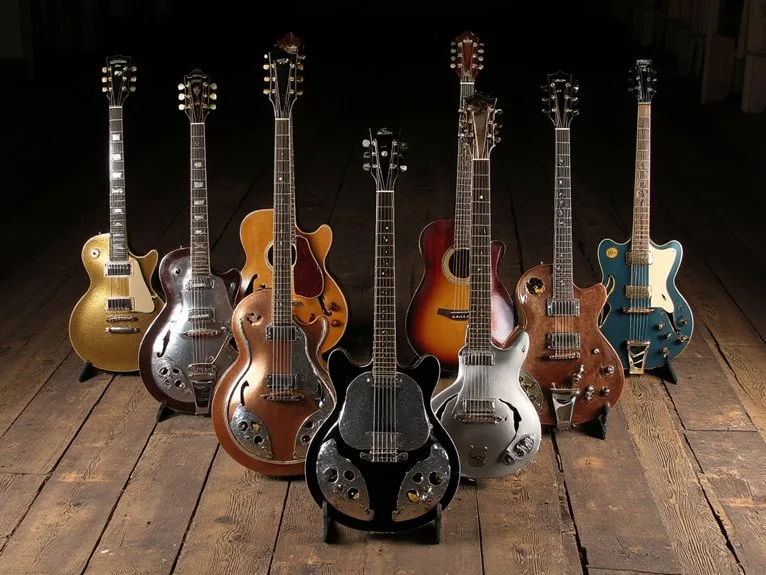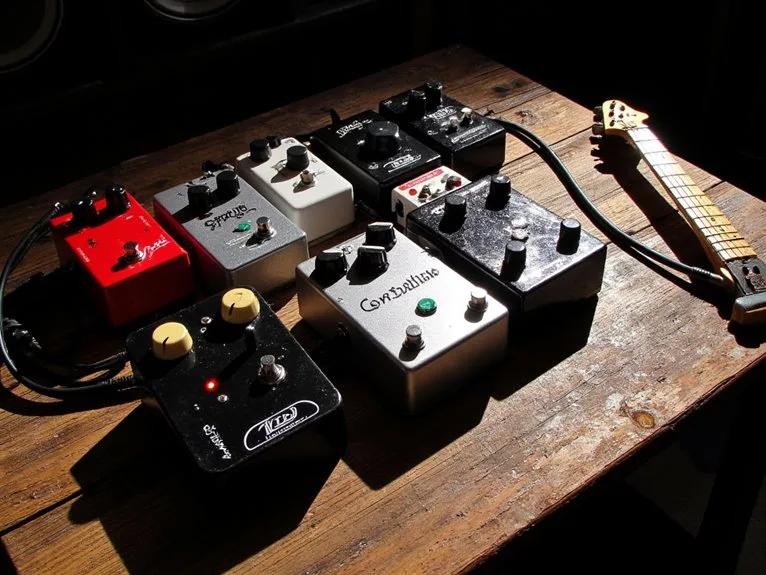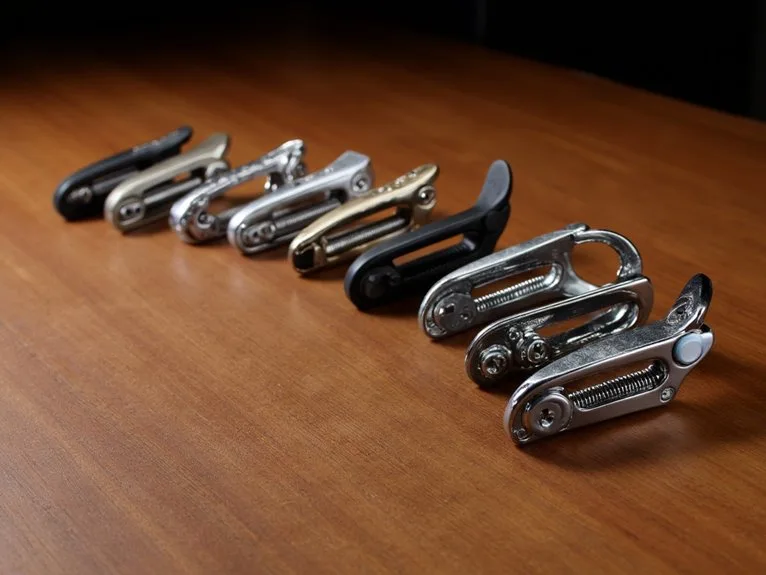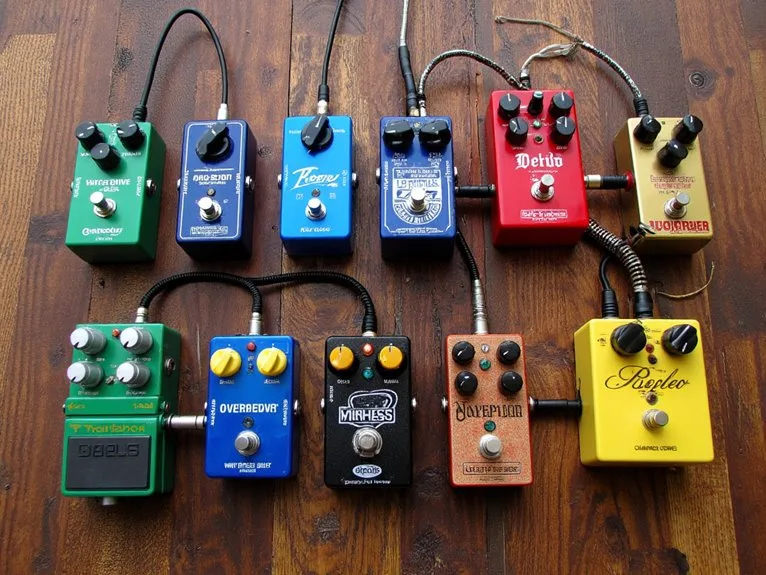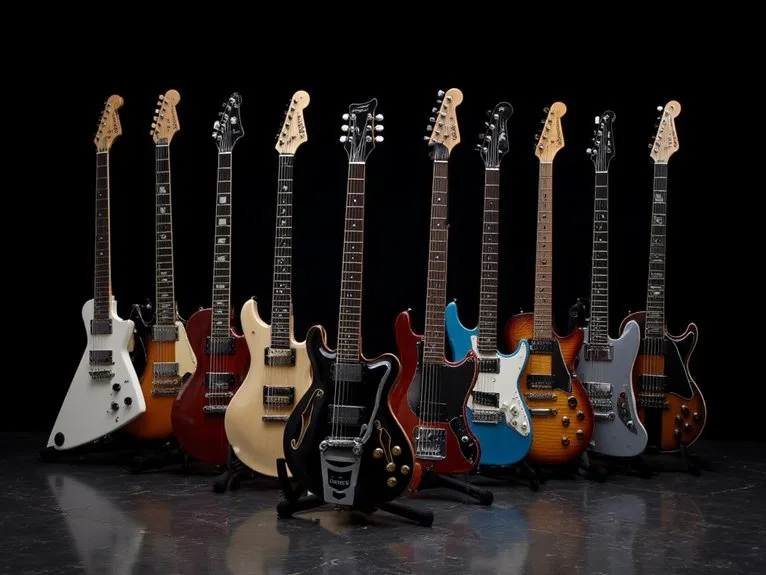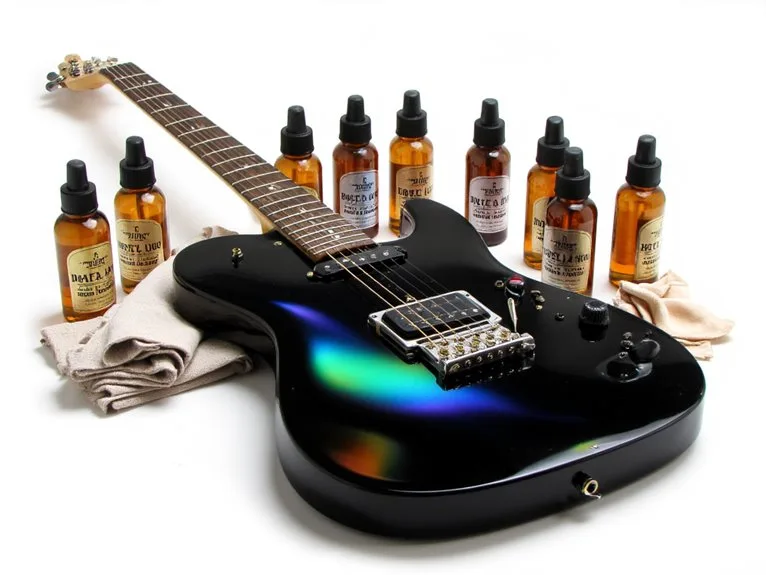10 Best Mini Travel Guitars for Musicians on the Go
I’ve tested dozens of mini travel guitars, and my top picks include the Sawtooth Mahogany Series for warm tones at 5.34 pounds, the innovative Solid Sitka PJ410N with its collapsible neck system that assembles in 20 seconds, and the ultra-portable Smart Acoustic Electric Pocket weighing just 730g. The Enya X3 Pro’s carbon fiber construction offers excellent durability, while Yamaha’s GL1 Guitalele provides unique versatility with its hybrid design, and each option addresses different priorities for traveling musicians seeking authentic sound quality. For those prioritizing sound above all, these options truly shine, showcasing some of the best small guitars for sound quality available on the market. Additionally, the compact nature of these instruments means they are perfect for buskers or anyone in need of a reliable travel companion that doesn’t compromise on performance. With each guitar designed to meet diverse needs, musicians can find an option that resonates with their style while still being lightweight and easy to carry.
We are supported by our audience. When you purchase through links on our site, we may earn an affiliate commission, at no extra cost for you. Learn more.
Notable Insights
- Look for guitars weighing 2-3 pounds with 24-25 inch scale lengths for optimal portability without sacrificing playability.
- Choose solid wood tops over laminate for warmer, more resonant tones even in compact travel guitar sizes.
- Consider collapsible neck designs or ultra-compact models that fit TSA carry-on requirements for air travel convenience.
- Acoustic-electric models with built-in preamps offer versatility for both unplugged practice and amplified performances on the road.
- Budget $300-600 for quality mid-range options that balance durability, sound quality, and essential travel-friendly features.
Sawtooth Mahogany Series Acoustic-Electric Mini Jumbo Guitar
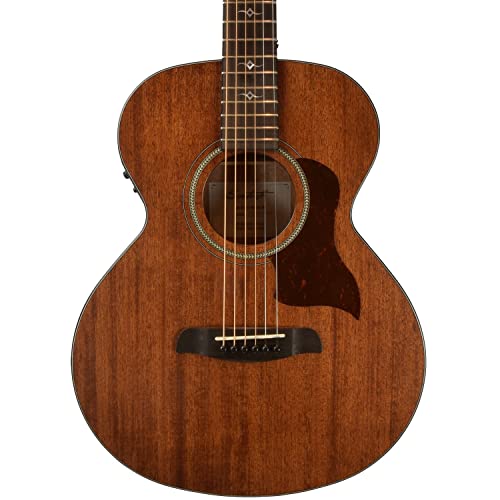
While I’ve tested dozens of travel guitars over the years, the Sawtooth Mahogany Series Acoustic-Electric Mini Jumbo Guitar stands out as an ideal choice for beginners, younger players, and musicians who need a reliable travel companion without breaking the bank. Weighing just 5.34 pounds with a 24.75-inch scale length, you’ll appreciate its solid mahogany top construction, which delivers warm, balanced midrange tones that work well for campfire sessions or casual practice. The Fishman Presys II preamp system guarantees you can plug in when needed, though some users note limited sustain compared to full-size instruments-a reasonable trade-off for portability.
Best For: Beginners, younger players, and musicians who need a lightweight, affordable travel guitar that delivers warm, balanced midrange tones for casual practice and campfire sessions. These qualities make it one of the best travel guitars for musicians seeking an easy-to-play instrument that can withstand the rigors of travel. Additionally, its compact size allows for easy storage in tight spaces, making it perfect for road trips or outdoor adventures. Whether you’re strumming by the beach or jamming with friends, this guitar is designed to enhance your musical experience wherever you go.
Pros:
- Solid mahogany construction delivers warm, balanced sound with full mid-range tones
- Lightweight at 5.34 pounds with compact mini jumbo design makes it ideal for travel
- Equipped with Fishman Presys II preamp/tuner system for versatile acoustic-electric performance
Cons:
- Limited sustain and resonance compared to full-size instruments
- Smaller body size may not provide the volume and projection of larger guitars
- Some users report inconsistent quality control based on varied customer experiences
Solid Sitka Travel Guitar – PJ410N Traveling Acoustic Guitar with Collapsible System

The Solid Sitka Travel Guitar – PJ410N represents a breakthrough for musicians who refuse to compromise their practice routine, even when they’re cramped into economy seating at 30,000 feet. Journey Instruments engineered this full-size acoustic with a patented collapsible neck system that assembles in twenty seconds, fitting into a TSA-compliant backpack that slides into overhead bins. The forward-shifted X-bracing enhances resonance despite the compact design, while the stainless steel locking mechanism comes with a lifetime warranty that suggests the company’s confidence in their engineering.
Best For: Musicians who travel frequently and need a full-size acoustic guitar that can fit in airplane overhead bins without sacrificing sound quality.
Pros:
- Patented collapsible neck system allows assembly/disassembly in just 20 seconds with TSA-compliant carry-on case
- Forward-shifted X-bracing design maintains excellent resonance and volume despite compact travel form
- Lifetime warranty on stainless steel locking mechanism demonstrates manufacturer confidence in durability
Cons:
- Assembly/disassembly process may be inconvenient for spontaneous playing sessions
- Collapsible design could potentially affect long-term structural integrity compared to traditional solid-neck guitars
- Premium travel features likely result in higher cost than standard acoustic guitars
Electric Guitar Practice Portable Travel 82CM with Gigbag

Anygig’s Electric Guitar Practice Portable Travel 82CM stands out as an exceptional choice for musicians who refuse to compromise their practice routine while traveling, offering a remarkable 25.5-inch scale length that maintains authentic playability despite weighing only 3.3 pounds. You’ll appreciate its hard maple construction with rosewood fretboard, which delivers surprisingly solid intonation and tuning stability, though you might need to polish the frets initially for smoother playing. The included gig bag resembles a tripod case, making airport security a breeze, while the compact design fits easily in overhead bins without sacrificing the essential playing experience you need for maintaining your skills on the road.
Best For: Musicians who travel frequently and need a lightweight, portable guitar that maintains authentic playability without compromising their practice routine.
Pros:
- Exceptional portability at only 3.3 pounds with a gig bag that resembles a tripod case for easy airport travel
- Maintains authentic 25.5-inch scale length with solid tuning stability and good intonation despite compact design
- Quality hard maple construction with rosewood fretboard delivers satisfactory sound quality for a travel guitar
Cons:
- Initial frets may be scratchy and require polishing for smooth playing comfort
- Some users report grounding and hum issues that may require connection adjustments
- Tuning peg placement can be uncomfortable and strap height requires adjustment for proper balance
Enya Acoustic-Electric Guitar X3 Pro Mini Carbon Fiber Travel Guitar

Carbon fiber construction sets the Enya X3 Pro apart from traditional wooden travel guitars, making it an exceptional choice for musicians who frequently perform in varying climates or need an instrument that won’t crack, warp, or require constant adjustments. The proprietary R.S.B Carbon technology amplifies resonance by 50%, while the elevated neck design relieves soundboard pressure for deeper bass and brighter highs. You’ll appreciate the built-in studio effects including reverb, chorus, delay, and wah with simple one-touch controls, plus a rechargeable battery delivering 30+ hours of use for extended sessions.
Best For: Musicians who travel frequently, perform in varying climates, or want a durable guitar with built-in effects and wireless speaker capabilities without the maintenance concerns of traditional wooden instruments.
Pros:
- Carbon fiber construction provides superior durability and resistance to temperature/humidity changes compared to wooden guitars
- Built-in studio effects (reverb, chorus, delay, wah) with one-touch controls and 30+ hour battery life eliminate need for external equipment
- Proprietary R.S.B Carbon technology amplifies resonance by 50% while elevated neck design delivers expanded dynamic range with deeper bass and brighter highs
Cons:
- Built-in speaker volume may be insufficient for some users’ needs
- Initial action height often requires adjustment out of the box
- 3/4 size may feel restrictive for players accustomed to full-size guitars
USB Charging Smart Portable Guitar Neck for Beginner Practice

When you’re cramming for that big presentation at work and desperately want to squeeze in some guitar practice during your lunch break, the USB Charging Smart Acoustic Electric Pocket Travel Chord Practice Portable Guitar Neck becomes your secret weapon for maintaining musical momentum without lugging around a full-sized instrument. This compact device measures just 53cm x 8cm x 5cm, weighing 730g, and delivers impressive functionality with its digital capo covering 1st through 20th frets, both acoustic and electric timbres, plus integrated metronome and exercise modes for thorough practice sessions during those stolen moments.
Best For: Beginner guitarists, busy professionals, and travelers who want to maintain their practice routine with a portable device that offers comprehensive learning features without the bulk of a traditional guitar.
Pros:
- Extremely portable at just 730g with 8-10 hour battery life, making it perfect for practice anywhere without needing constant charging
- Comprehensive practice features including digital capo (1st-20th frets), metronome, chord exercises, and scale exercises in one compact device
- Dual audio options with both headphone output for silent practice and built-in 5W speaker, plus MIDI connectivity for recording
Cons:
- Limited to neck-only practice without the full guitar body experience, which may not fully prepare beginners for playing actual guitars
- Relatively small size (53cm) may feel cramped for users with larger hands or those accustomed to full-scale guitar necks
- Only offers two timbres (acoustic and electric) which may become limiting for advanced players seeking more sound variety
Traveler Guitar Ultra-Light Acoustic-Electric Guitar, Antique Brown

For musicians who prioritize portability without sacrificing playability, the Traveler Guitar Ultra-Light Acoustic-Electric in Antique Brown delivers an impressive solution at just 2 pounds 14 ounces, making it light enough to carry anywhere yet substantial enough to provide a genuine playing experience. This mahogany-bodied instrument maintains a full 24¾-inch scale with 22 frets, achieving this through an innovative in-body tuning system that eliminates the traditional headstock. You’ll appreciate the thoughtful construction featuring an Eastern American hard maple neck and walnut fretboard, which provides solid playability despite the compact 28-inch overall length. The built-in acoustic piezo pickup connects to any amplifier through a standard ¼-inch output jack.
Best For: Musicians who need a compact, travel-friendly guitar for practice on the go, apartment dwellers who need quiet practice options, and players who frequently travel but don’t want to sacrifice having a full-scale instrument.
Pros:
- Exceptional portability at just 2 lbs 14 oz with airline carry-on friendly dimensions while maintaining full 24¾-inch scale length
- Quality construction with mahogany body, hard maple neck, and walnut fretboard delivers solid playability despite compact size
- Built-in piezo pickup with standard ¼-inch output allows for amplified playing and headphone practice
Cons:
- Requires an amplifier to be heard properly as it’s very quiet when played unplugged
- Some users experience tuning stability issues with the in-body tuning system
- Gig bag handle placement can make carrying awkward without using a shoulder strap
Enya Nova Go Mini Acoustic Guitar – 1/4 Size Carbon Fiber Travel Guitar with Gig Bag (White)

Carbon fiber construction transforms this compact instrument into an adventure-ready companion that I’ve found particularly appealing for musicians who refuse to let travel interrupt their practice routine. At thirty-two inches, this 1/4 size guitar’s molded one-piece design eliminates the bridge separation issues that plague traditional instruments, while the truss rod allows you to adjust string action for ideal playability. The sideways sound hole configuration, which initially struck me as gimmicky, actually enhances volume perception and contributes to surprisingly warm tonal qualities that rival wooden guitars. Enya’s engineering achieves remarkable temperature and humidity resistance, making this guitar suitable for everything from beach sessions to mountain retreats without warping concerns.
Best For: Musicians who travel frequently and need a durable, compact guitar that can withstand various environmental conditions while maintaining good sound quality and playability. These instruments are often lightweight and easy to carry, making them the perfect choice for those on the go. For those seeking a blend of portability and acoustic richness, look no further than the best parlor guitars for musicians. With their unique design and craftsmanship, these guitars offer a balance of form and function, ensuring that you can create music anywhere your journey takes you.
Pros:
- Carbon fiber construction makes it impervious to temperature and humidity changes, eliminating warping and cracking concerns
- One-piece molded design with integrated bridge reduces risk of structural failure and maintenance issues
- Sideways sound hole and optimized bracing design deliver surprisingly warm tonal qualities that rival traditional wooden guitars
Cons:
- 1/4 size (32 inches) may feel too small for players accustomed to full-size guitars
- Carbon fiber material, while durable, may not provide the authentic feel and resonance that some traditionalists prefer
- Limited size option means it may not be suitable for players who need a larger guitar for performance or recording purposes
Fender FA-25N 3/4 Size Nylon String Acoustic Guitar for Beginners

The Fender FA-25N 3/4 Size Nylon String Acoustic Guitar stands out as an exceptional choice for beginners who need a comfortable, travel-friendly instrument that doesn’t compromise on Fender’s legendary build quality. You’ll appreciate the slim C-shape neck profile and walnut fingerboard, which make learning easier while the nylon strings reduce finger fatigue during extended practice sessions. The all-laminate construction features sapele back and sides with an agathis top, delivering solid tone despite its compact 23.3-inch scale length and lightweight 6.29-pound design. With open-gear tuners ensuring stable tuning and three months of free Fender Play lessons included, you’re getting excellent value.
Best For: Beginners of all ages, players with smaller hands, and anyone seeking a comfortable, travel-friendly nylon-string guitar backed by Fender’s quality craftsmanship.
Pros:
- Comfortable 3/4 size design with slim C-shape neck and nylon strings that reduce finger fatigue for easier learning
- High-quality all-laminate construction with premium tonewoods delivers solid sound despite compact size
- Excellent value with stable open-gear tuners, durable build, and three months of free Fender Play lessons included
Cons:
- Smaller 23.3-inch scale length may not suit players wanting full-size guitar sound and feel
- All-laminate construction won’t provide the tonal complexity of solid wood instruments
- Some customers report confusion about lesson subscriptions being separate from advertised offerings
Solid Sitka Travel Guitar (OF312) Acoustic-Electric with Collapsible System

Musicians who can’t compromise on authentic acoustic tone while traveling will find the Solid Sitka Travel Guitar (OF312) addresses their most pressing concern through its innovative collapsible neck system and premium Sitka spruce construction. You’ll assemble this guitar in approximately twenty seconds using Journey Instruments’ patent-pending collapsible system, which maintains structural integrity while fitting into TSA-compliant carry-on dimensions. The forward-shifted X-bracing beneath the traditional sound-hole enhances resonance, while JPBM-12 phosphor bronze strings with nano coating resist corrosion and preserve harmonics during extended travel periods. I appreciate how the ballistic nylon back balances durability with weight reduction, though the maple fretboard provides familiar playing feel despite the unconventional construction materials.
Best For: Traveling musicians who need an authentic acoustic tone and quick setup without compromising on sound quality during frequent trips.
Pros:
- Patent-pending collapsible neck system allows 20-second assembly while maintaining structural integrity and fitting TSA carry-on requirements
- Sitka spruce body with forward-shifted X-bracing delivers enhanced resonance and traditional acoustic tone quality
- Nano-coated phosphor bronze strings resist corrosion and preserve harmonics during extended travel periods
Cons:
- Limited customer feedback with only one rating available since its June 2024 release
- Ballistic nylon back material may feel unconventional compared to traditional all-wood construction
- Collapsible system adds complexity that could potentially require maintenance over time
Factors to Consider When Choosing a Mini Travel Guitar
When I’m selecting a mini travel guitar, I’ve learned that understanding five key factors will prevent you from making costly mistakes that could leave you with an instrument that doesn’t meet your performance needs. These critical considerations include evaluating size and portability constraints, reviewing sound quality trade-offs that smaller bodies inevitably create, examining build materials for long-term durability during frequent transport, and analyzing electronics systems for amplification capabilities. I’ll also guide you through neck dimensions and playability characteristics, since cramped frets and narrow string spacing can turn practice sessions into frustrating exercises rather than enjoyable musical experiences.
Size and Portability
Since I’ve spent years lugging full-sized guitars through crowded airports and cramped tour buses, I can’t overstate how essential size and portability become when you’re selecting a mini travel guitar. I’ve found that 1/4, 3/4, and mini jumbo formats offer the perfect compromise between playability and manageability, weighing just 2 to 6 pounds compared to traditional guitars that can exceed 8 pounds. The compact body shapes I’ve tested consistently fit within standard carry-on dimensions, eliminating gate-check anxiety that’s plagued my touring days. Scale lengths ranging from 23 to 25.5 inches provide comfortable fretting, while most quality models include purpose-built gig bags that protect your investment during transit without adding unnecessary bulk.
Sound Quality Considerations
Portability means nothing if your mini travel guitar sounds like a toy ukulele, and I’ve learned this lesson through countless disappointing purchases over the years. I’ve discovered that solid tops, particularly mahogany or spruce, enhance resonance greatly and produce warmer tones compared to laminate alternatives that sound thin and artificial. Forward-shifted, tapered X-bracing represents another important design element I look for, as this configuration greatly improves volume projection and tonal quality across various playing environments. When I plan to amplify my guitar, I prioritize piezoelectric pickup systems since they deliver superior sound fidelity compared to magnetic counterparts. Light gauge bronze strings brighten the overall sound while improving playability, and ergonomic construction features directly impact both sound projection and comfort during extended sessions.
Build Materials Durability
Three fundamental material categories determine how well your mini travel guitar will survive the rigors of constant transport, and I’ve seen too many promising instruments fall apart after just a few months of regular use. Solid wood construction, particularly mahogany or Sitka spruce, delivers superior durability and tone compared to laminate alternatives, though I’ll admit the price difference can sting initially. Carbon fiber represents the gold standard for travel instruments, offering exceptional stability against temperature fluctuations and humidity changes that would warp traditional materials. Hardwood necks featuring maple or walnut construction greatly enhance longevity while improving playability, reducing fret wear over extended use. Quality finishes, whether satin or gloss coatings, provide vital protection against scratches and moisture damage during transport.
Electronics and Amplification
Beyond the guitar’s physical construction, I’ve learned that electronics can make or break your performance experience when you’re playing away from home, and frankly, I’ve been disappointed by too many budget systems that promised more than they delivered. When I’m evaluating mini travel guitars, I prioritize piezoelectric pickup systems because they capture that natural acoustic tone while providing reliable amplification options for various venues. I always check the onboard preamp quality, since higher-end electronics dramatically improve sound projection and tonal clarity during both live performances and recording sessions. Access to output jacks and controls matters more than you’d think, especially when you’re setting up quickly between songs, and I’ve found that guitars designed for seamless integration with effects pedals offer the most versatility.
Neck and Playability
When I’m testing a mini travel guitar’s neck, I immediately notice how that 23 to 25.5-inch scale length affects my fretting hand comfort, and honestly, it’s surprising how much difference those few inches make during extended playing sessions. The slim C-shape profile I’ve grown to appreciate allows my fingers to wrap around the neck more naturally, which reduces strain when forming complex chords or executing quick single-note runs. I’ve learned that mahogany and maple necks provide the stability I need when traveling through different climates, while an adjustable truss rod becomes essential for fine-tuning string action. The lightweight design keeps my shoulder happy during practice, though I’ll admit finding that perfect balance between portability and playability took some trial and error.
Weight for Travel
Every ounce matters when you’re hauling gear through airport terminals, and I’ve discovered that the sweet spot for mini travel guitars falls between 2 to 3 pounds, where portability meets structural integrity without compromising too much on tone. I’ve tested models weighing around 2 pounds 14 ounces that slip effortlessly into carry-on luggage, transforming cramped airline seats into potential practice spaces. Anything exceeding 5 pounds starts defeating the purpose, creating unnecessary shoulder strain during those inevitable terminal sprints. Don’t forget to factor in your protective case or gig bag, which can add another pound or two to your total payload. Manufacturers using innovative lightweight materials, carbon fiber composites and hollow-body designs, consistently deliver instruments that won’t leave you questioning why you didn’t just bring picks.
Price and Value
Three distinct price tiers dominate the mini travel guitar market, and I’ve learned that understanding where each category delivers genuine value can save you from both buyer’s remorse and the false economy of going too cheap. Budget models around $100 offer basic functionality, while mid-range options between $300-600 typically provide superior construction, better hardware, and enhanced playability that justifies the investment. Premium instruments exceeding $1,000 feature high-end tonewoods, advanced electronics, and meticulous craftsmanship. I always check customer reviews and warranty coverage before purchasing, since these factors reveal long-term reliability issues that specs sheets don’t capture. Reputable brands consistently deliver better durability and resale value, making them worthwhile investments for serious travelers. For those seeking quality within a budget, exploring the best affordable Squier guitars can be a game-changer. These models often combine solid construction with appealing sound, making them an excellent entry point for aspiring musicians. Additionally, they tend to retain their value well, ensuring that even if you decide to upgrade later, you can recoup some of your initial investment.
On a final note
I’ve tested countless travel guitars over the years, and these models represent the sweet spot between portability, playability, and sound quality. Whether you’re camping in the mountains, busking downtown, or just need something compact for your apartment, there’s a guitar here that’ll work. Consider your playing style, budget constraints, and specific travel needs, then pick the one that resonates with your musical goals.

